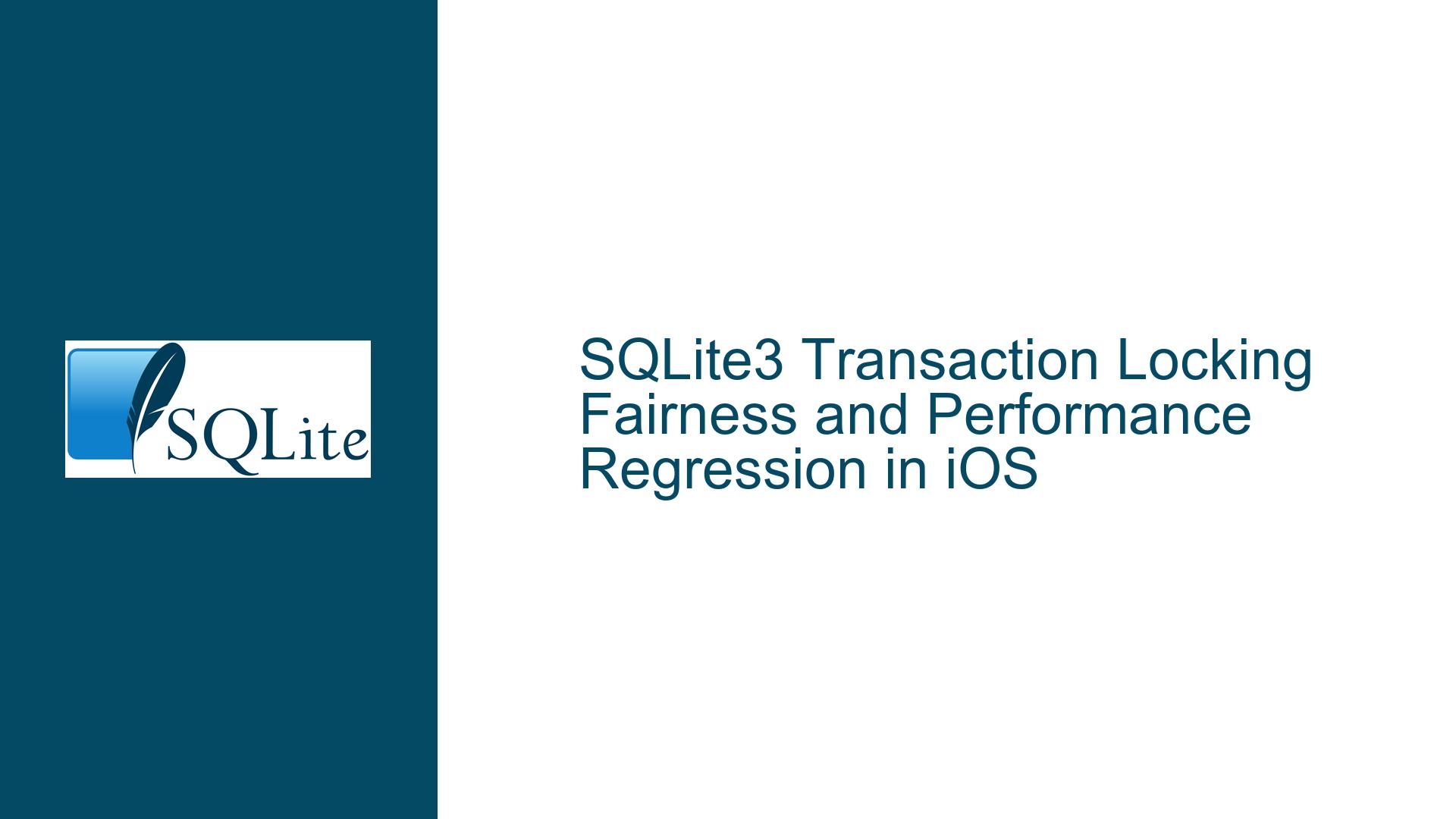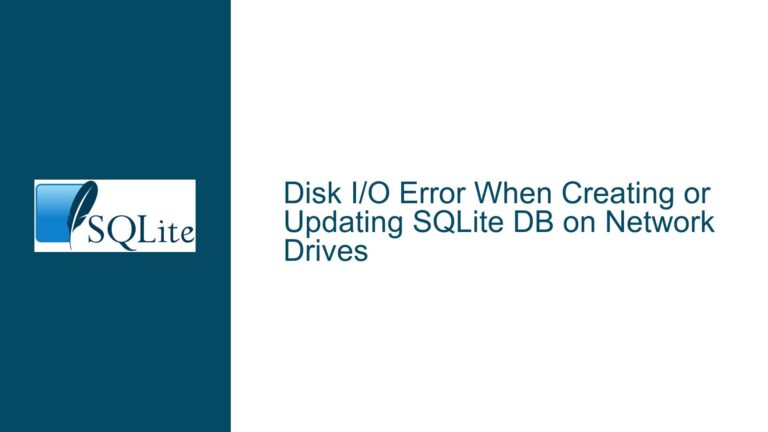SQLite3 Transaction Locking Fairness and Performance Regression in iOS
Transaction Locking Contention and Debug Build-Induced Performance Degradation in SQLite3 for iOS
Unfair Transaction Lock Acquisition Under Concurrent Thread Access
The core issue revolves around SQLite3’s transaction locking behavior in a multi-threaded iOS environment where two threads (Thread A and Thread B) compete for write access to the database. When Thread B holds an active transaction, Thread A’s attempt to execute BEGIN IMMEDIATE TRANSACTION enters a blocked state despite SQLite3’s busy_timeout being configured for 60-second retries. Logs reveal Thread B reacquires locks within 1 second post-commit while Thread A remains blocked until the 60-second timeout expires, triggering critical application failure. This behavior contradicts expectations that SQLite3 would allow Thread A immediate lock acquisition upon Thread B’s transaction completion. The problem persists across SQLite3 versions but becomes particularly acute after upgrading from 3.24.0 to 3.43.2 on iOS, accompanied by a 3X slowdown in update operations traced to debug-compiled SQLite binaries.
SQLite3 employs a cooperative locking model where transactions request progressively stronger locks (UNLOCKED → SHARED → RESERVED → PENDING → EXCLUSIVE). The BEGIN IMMEDIATE command attempts to escalate to RESERVED lock immediately, blocking other writers. The busy_timeout parameter instructs SQLite to retry lock acquisition for the specified duration using an exponential backoff algorithm. However, this implementation lacks fairness guarantees – newly arriving lock requests may acquire locks before older queued requests due to timing variances in retry intervals. When combined with thread scheduling nuances in iOS (GCD/libdispatch), this creates priority inversion scenarios where aggressive writers starve others. The debug build complication arises from SQLite’s extensive use of assert() statements that triple execution time when enabled, disproportionately affecting write-heavy workloads.
Exponential Backoff Collisions and Debug-Assert Overhead
The unfair lock acquisition stems from three interrelated factors: SQLite3’s non-deterministic busy handler retry logic, iOS threading model characteristics, and unintended use of debug-compiled SQLite binaries. The default busy_timeout handler employs an exponentially increasing delay between retries (starting at ~1ms, doubling each attempt). While designed to reduce contention, this allows newer transactions arriving during Thread B’s commit phase to initiate retries with shorter initial delays, "cutting in line" ahead of Thread A’s older request. On iOS, GCD’s thread pool management and QoS classes exacerbate this by prioritizing newer work items over stalled transactions. Thread A’s retry attempts enter increasingly longer sleep intervals (e.g., 1ms → 2ms → 4ms → … → 512ms), creating windows where Thread B’s subsequent transactions slip through during A’s backoff periods.
The performance degradation observed post-upgrade to SQLite 3.43.2 on iOS traces to build configuration rather than version changes. Debug builds enable SQLITE_DEBUG, SQLITE_ENABLE_SELECTTRACE, and other diagnostic features that disable compiler optimizations and inject thousands of assertion checks. These asserts validate internal invariants during cursor movements, B-tree modifications, and page cache operations – all frequent in update transactions. For example, each row update in a debug build triggers sqlite3BtreeMovetoUnpacked() assertions verifying cell positioning, adding µs-level overhead that aggregates to 3X slower bulk operations. Android builds remained performant because they linked against release-mode SQLite binaries, whereas iOS erroneously used debug builds lacking NDEBUG flags.
Implementing Fair Retry Policies and Build Configuration Hardening
Mitigating Lock Unfairness with Constant Backoff and Priority Queues
Replace SQLite3’s default exponential backoff busy handler with a deterministic retry strategy. Implement a custom busy handler that enforces fixed 50ms retry intervals, reducing contention windows for late-arriving transactions:
int customBusyHandler(void *data, int attempt) {
if (attempt >= (60000 / 50)) { // 60s timeout / 50ms per attempt
return 0; // Abort after timeout
}
usleep(50000); // 50ms constant delay
return 1; // Retry
}
// Attach to connection:
sqlite3_busy_handler(db, customBusyHandler, NULL);
For enhanced fairness, maintain a global FIFO queue of pending transactions using dispatch barriers. Wrap transaction attempts in a dispatch barrier block to serialize write requests:
let writeQueue = DispatchQueue(label: "com.example.dbwriter", attributes: .concurrent)
func beginImmediateTransaction() {
writeQueue.async(flags: .barrier) {
try! db.execute("BEGIN IMMEDIATE TRANSACTION")
}
}
Debug-to-Release Build Transition and Compilation Flags
Ensure iOS builds link against SQLite3 compiled with:
CFLAGS="-DSQLITE_THREADSAFE=1 -DSQLITE_DQS=0 -DNDEBUG -DSQLITE_DEFAULT_MEMSTATUS=0 -DSQLITE_OMIT_DEPRECATED -DSQLITE_OMIT_SHARED_CACHE -DSQLITE_MAX_EXPR_DEPTH=0 -Os"
Validate the binary’s configuration using sqlite3_compileoption_used('NDEBUG') and sqlite3_compileoption_get(0). For Xcode projects, add NDEBUG=1 to GCC_PREPROCESSOR_DEFINITIONS in release build settings. Prefer amalgamation builds over system libsqlite3 to control optimization flags.
Transaction Scope Minimization and Lock Monitoring
Instrument transactions with telemetry to detect long-held locks. Wrap all transactions in sqlite3_profile hooks to log duration:
void profileCallback(void *userData, const char *sql, sqlite3_uint64 ns) {
NSLog(@"Transaction duration: %.2fms for %s", ns / 1e6, sql);
}
sqlite3_profile(db, profileCallback, NULL);
Enforce transaction timeouts using sqlite3_progress_handler() to interrupt long-running operations:
sqlite3_progress_handler(db, 100, [](void *ctx) -> int {
return *(std::chrono::steady_clock::now() - startTime) > 60s;
}, &startTime);
WAL Mode and Shared Cache Configuration
Mitigate writer starvation by enabling Write-Ahead Logging (WAL) mode, allowing concurrent reads with single writes:
PRAGMA journal_mode=WAL;
PRAGMA wal_autocheckpoint=1000;
Avoid shared cache mode (SQLITE_OPEN_SHAREDCACHE) in multi-threaded environments, as it increases lock granularity contention. Prefer separate connections per thread with exclusive locking:
let db = try! Connection("file:data.db?mode=rwc&cache=private", readonly: false)
Post-Timeout Crash Prevention and State Recovery
Instead of crashing on transaction timeout, implement retry fallbacks with jitter to prevent synchronized retry stampedes:
func beginTransactionWithRetry(maxRetries: Int) throws {
var retries = 0
while retries < maxRetries {
do {
try db.execute("BEGIN IMMEDIATE TRANSACTION")
return
} catch SQLiteError.SQLITE_BUSY {
let jitter = Int.random(in: 50..<500)
Thread.sleep(forTimeInterval: Double(jitter) / 1000)
retries += 1
}
}
throw TransactionError.timeout
}
Legacy Version Analysis and Regression Testing
When upgrading SQLite versions (e.g., 3.28 → 3.43), audit changelogs for locking algorithm changes. Test with SQLITE_ENABLE_UNLOCK_NOTIFY to verify if unlock notifications improve fairness. For iOS-specific regressions, compare sqlite3_os_init() implementations across versions to detect platform integration changes affecting pthread mutex priorities.
Diagnostic Queries and Lock State Visibility
Monitor pending locks in real-time using sqlite3_db_status() and PRAGMA lock_status (if compiled with SQLITE_DEBUG):
SELECT * FROM pragma_lock_status WHERE type IN ('reserved', 'pending', 'exclusive');
Log lock state transitions via sqlite3_trace_v2() with SQLITE_TRACE_CLOSE | SQLITE_TRACE_PROFILE flags to capture lock acquisition/release timing.
Thread Sanitizers and Lock Hierarchy Validation
Enable Clang Thread Sanitizer (TSAN) to detect lock inversion patterns and unbalanced sqlite3_step()/sqlite3_reset() calls that leave statements open. Instrument connection objects with stack trace capture on initialization to identify leaked transactions:
@implementation SQLiteConnection {
NSArray<NSNumber *> *_openTransactionStack;
}
- (void)beginTransaction {
_openTransactionStack = [NSThread callStackReturnAddresses];
sqlite3_exec(_db, "BEGIN", NULL, NULL, NULL);
}
Cross-Platform Consistency Checks
Validate Android and iOS SQLite configurations using compile-time and runtime introspection:
// Android
String compileOptions = SQLiteDatabase.openDatabase(":memory:", null,
SQLiteDatabase.OPEN_READWRITE).getCompileOptions().toString();
// iOS
let options = try! db.prepare("PRAGMA compile_options").map { $0[0] as! String }
print("iOS SQLite options: \(options)")
Enforce identical PRAGMA settings (e.g., synchronous, journal_mode) across platforms to eliminate configuration skew as a variable in cross-platform performance discrepancies.






